Is This Love! An Interview with Glen Awong of Maoli
I have had the honor of interviewing many island reggae artists from J Boog to The Green to Ekolu. All of them are as interesting and awesome as their music. Maoli also fits with some of the great talent coming from the islands of Hawaii.
I sat down with Glenn Awong, lead singer of Maoli, to talk about their soon to be released album, One Eighty, their new outlook on life and music, and of course island reggae. Glenn was one of the most candid interviews I've conducted and has some gems that I can't wait to share with you all.
I suggest; sitting back, turn up Maoli's EP, and reading through this interview. Shoutout to Da 808 Music Crew and Hawaii's Finest.

Photo Credit: Fel Pajimula
Please introduce yourself and let us know about the band Maoli.
I'm Glen Awong and I'm the lead vocalist for the group Maoli. We have brother Kakana Akiu-Corpuz (Kana) who is the bass player, and Nu'u Sing-Kahalenhau who is the lead guitar and vocalist.
We started Maoli in 2007 and released our first album, "Groovin" in 2008. Back then in 2008, we did really well at home. There was a lot of festivals and things that we built a lot of support from.
We got a lot of support in Hawaii.
For the last 3 years, we've been on the road building the audience and spreading the word about Maoli in the States.
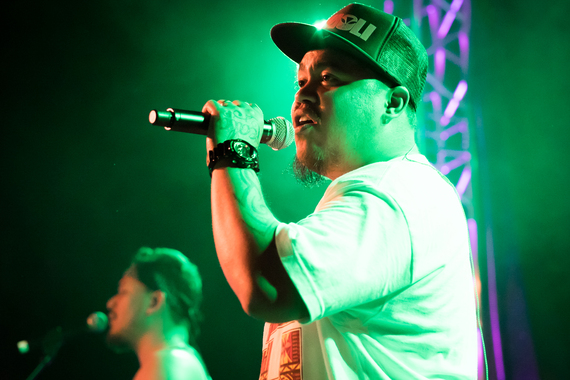
Photo Credit: Brad Puet
Speaking about the first album, can you tell us the backstory on it?
So what had happened was, me and the bass player Kana, went to high school together. We had our group called, "No Boundaries" back in the days. It was another reggae group and we did well. But I had to leave for New York City with my girlfriend, who is my wife now. Yea, I ended up following my wife there.
When I came back, I really didn't want to pursue music. My ex-manager, who is my uncle, kept on telling me to do music. So I said, "Ok let's do it." And he said first step is to go into the studio and make an album. I used songs that I wrote when I was 14 and when I went into record I was 21. From coming back to getting into the studio, everything happened so quick. In the studio, I was feeling it and when we were recording, it was just me and the bass player. So what we did was just started to hire musicians to play on the songs.
After we was finished with it, I realized some things. When we release it, how are we going to promote it? We don't even have a band. So yea, we went into the studio before we actually even had a band.
When we made the band after, it was all after our first album was completed.
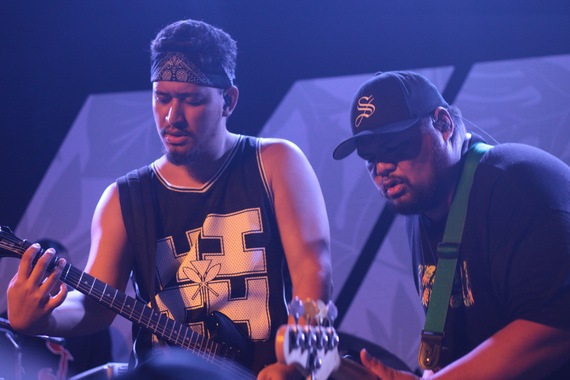
Photo Credit: Fel Pajimula
So you put together Maoli afterwards. How'd you come up with the name Maoli and what does it mean?
The word Maoli means, "Native."
You know because everything happened so quick and we didn't even have a band, I figured I had to come up with a name. I wanted to pick something that had meaning. I wanted a name that talks about where we were from and who we are. So I opened up the Hawaiian dictionary and I see the word Maoli.
I liked it. It means native and I knew it represented us. It shows our native culture. It shows where we're from. So that's why I chose that word for our name. Plus it's Hawaiian.
It says a lot about our music and where we are influenced. The Hawaiian side shows our harmonies and the tradition of where we are from. It is something that we've heard since we were young. You know the uncles would have these backyard jam sessions when we were younger. Us as kids, would just sit back there and listen. We would check it out because it was all about the harmonies, you know.
We learned a lot from those backyard sessions.
When we got older, we picked up from that and I'm sure you could hear it in the music. I think that's what separates us and our style of music from those in the mainland. We were raised on those types of harmonies and those harmonies were always on point.
As for the type of music we do (island reggae), it's starting to be its own genre. I know that we are all (other island reggae artists included) trying to push that. We have our own distinct sound you know. We aren't trying to force anything. It's what we grew up with. Kapena really helped in leading the way for all of us. Of course Bob Marley was an influence but I think Kapena definitely inspired all of us.
You said you've been writing songs since you were 14 and wrote the songs for the first album. Who else writes the songs for Maoli? When do you find time to write being so busy with tours and the off time with your family?

Photo Credit: Brad Puet
In the band, I'm the main songwriter but Nu'u also writes a lot of songs too. He comes from a long line of good songwriters. His father is a big inspiration for us, Shane Kahalehau,Shane Kahalehau Shane Kahalehau who came from the group Sly Dog. They are from back in the days like Kapena days actually. They were also a huge reggae group back home. Nu'u is a really good writer like his dad.
For me, real talk, I love to write. Whenever I get a chance, I'll sit down and just write. Even when I'm driving or in the shower, I'll hum melodies or the lyrics will come into my head. If they're good, I'll grab my phone and record it. I'm telling you, I love to write.
I know that as musicians we have a lot of influence on people. So being able to share this craft, and our words and really everything, we can help reach out to people and uplift them especially in this world we are living in now. Real talk, yea.
I have this opportunity to make a change and share our message which is to spread love all around. That's my music, you know. It's about love. It's about spreading that good vibe. It's what we do wherever we go. We plant those seeds and just keep spreading it.
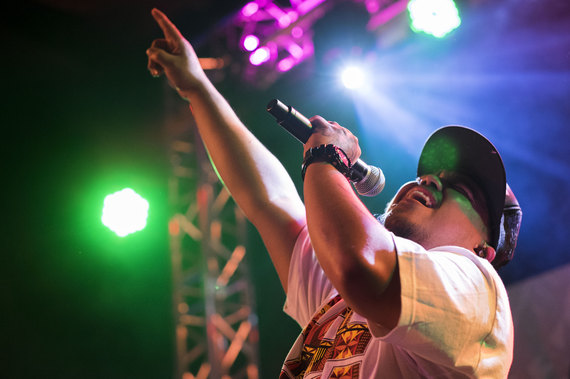
Photo Credit: Brad Puet
So out of the songs you've written, what is your favorite one?
I have to say, "Is This Love." It's my most recent but it's also my favorite.
For me, I made a lot bad choices in my life. Recently I'm born again full blown Christian now.
That song was written about my experience and relationship with God.
If you listen to the lyrics it says:
Is this love we got
If it is
Never let it stop
That's what the song is about. At the time I was still asking, "What is this? I want to give myself but I don't know what it is?"
Wow. I was just listening to that track and probably wouldn't have thought it was about that.
It's not talking about a woman, man (laughs).
It's about me and God. It's spiritual that song, a lot of biblical stuff. That's really what this new EP is about. That's why we titled it, "One Eighty." The music that I wrote before was about love, but where I was in my life really was a shady place. It's like before with the fast lifestyle; too much drugs, alcohol, all that stuff, I was blinded by all that stuff.
Now I see the light. I see that I have influence on people. Now I'm going to use it to do good. I want to spread that love, the love that I've witnessed, you know. That's why we named the EP, One Eighty. It's because I did the 180 degree turn, you know what I mean. I was going this way but now I'm going this way.
I'm not ashamed to give testimony. I've been down that other road and I'm good now. This is what the music is about now. The music is about love and uplifting all my brothers and sisters.
That's what the album is mainly going to be about.
What are some of the things you've learned in the last 7 years, from a 14 year old teen to a grown man touring all over?
It's kind of hard when I came into it. It was more of a hobby but when you get older, start your family, start having kids - you have to look at it as, "This is your bread and butter. This is how you are going to feed your family." I've learned to take responsibility and treat this as a business, as a job. That's really what I've learned since the beginning, you know what I mean.
In the beginning it's really cool like the people listen to your music and your like, "oh this is what it's about?" I think that is what a lot of up and coming musicians do is get caught up into the fast lane and everything like that. They don't realize at first that it is a business.
This is work.
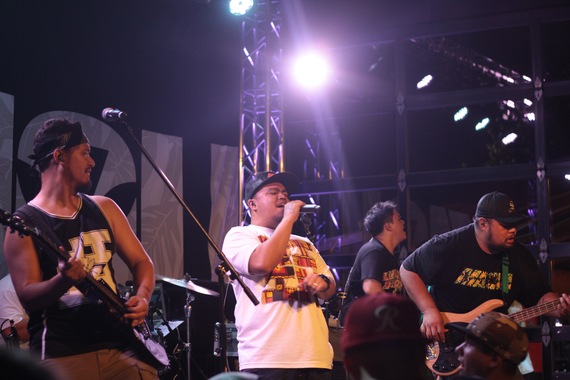
Photo Credit: Fel Pajimula
I ask this in almost all my interviews with musicians who have spent some time in the industry. Have you seen the industry changed?
YES. Yes. Definitely.
How so?
It has a lot to do with technology. It's changed everything. Back then you could buy records and CD's but nowadays you can just get it online and burn your own music. Albums don't sell like they used to before. Before we could sell a lot and not need to do what we do now. Because they don't sell as much, we have to be on the road more. We have to go out and really promote our music. It's different now.
Before the economy drop, we could make a living back home (Hawaii) in album sales and local shows. Now we are forced to reach out to a new, larger market and promote and sell our music. We need to find new fans. That's a big change for me. The whole Hawaiian scene I knew was easier and more comfortable. It's not just Maoli. A lot of the local bands from the Hawaii have to do this too.
It's a good thing too. It forced us to open our eyes to a whole new world, yea.
The only thing I don't like about being on the road is that I'm missing my family. Back then we didn't have to do that. Back home we didn't have to worry about that. We would go off the islands and have one offs and then come back, you know. When you're on the road from 4-6 weeks, you really start to miss home. You miss the kids and all that.
Other than that, the fans coming out and supporting is what keeps us going. Seeing the energy in the crowds makes it worth it for us. As long as the people keep coming out, we will keep doing it.
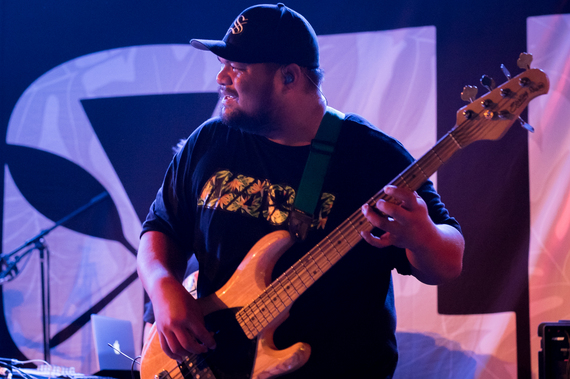
Photo Credit: Brad Puet
To close out the interview, very few of us get to understand or experience that lifestyle. Tell us more about life on the road and also what would you like to say to all the Maoli fans out there?
It's really hard. Again, at my point in my life, I treat it like a job. For example, people at home, they have a 9 to 5, yea. They have a routine. They wake up, get ready, go to work, come back home, and then relax. Repeat for the next day. It's a bit like that for me especially now. For me, I don't really do much partying. I mean this life is definitely a party lifestyle. But for us it's a job and we want to give a good show, plus, you don't want to see me drunk at a show (laughs). Or maybe you do, I don't know (laughs).
Touring is definitely a fast paced deal. We are in different cities every day. We are always moving, yea.
Outside of being away from family, I'm out doing what I love to do. This is a dream of mine.
Having the people know the lyrics to your song is a touching feeling, man.
I'm very thankful for our fans. Maoli is very thankful for our fans.
To our fans, thank you so much supporting and everything. We love you.
